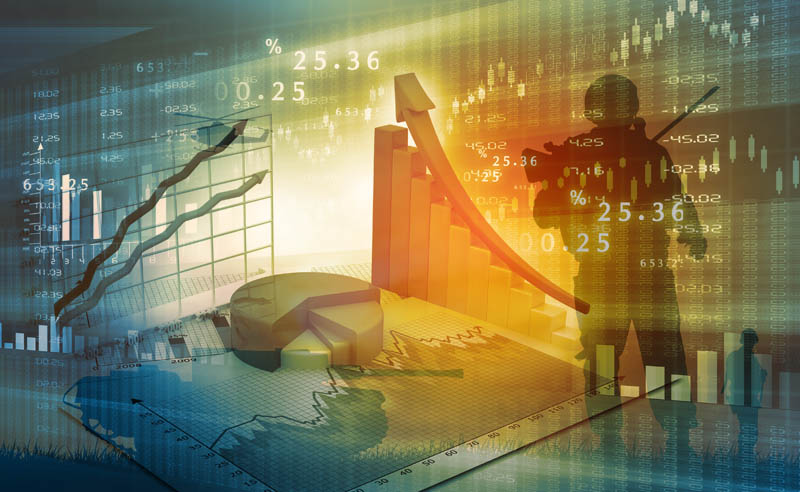(Justin Vaughn, Editor, Options Trading Report)
Inflation, Growth Worries Drag Down Indices… Stocks fell, with major indices posting a weekly loss, on Thursday. The week was shorter, as the markets closed in observance of Good Friday. Investors are beginning to show more worries that soaring inflation is starting to affect businesses. The Dow Industrial fell 113 points or 0.3% to 34451. The S&P 500 lost 54 points or 1.2% to 4392, a day after the broad index advanced 1.1% to snap a three-day losing streak. The tech-focused Nasdaq Composite dropped 292 points or 2.1% to 3351, a day after rising 2%. Investors this week got their first ‘peek’ at how companies fared in the first quarter as earnings season kicked off in earnest. Over the past year, corporate earnings have largely been on a tear thanks to government stimulus payments and strong consumer spending. The fear amongst traders and investors is that rising inflation will end that trend. “We’re starting to see some cracks in the foundation of the super-strong consumer, and it’s starting to have some impact on company bottom lines,” said Matt Peron, director of research at Janus Henderson Investors. “Retail sales are still good, but we saw JPMorgan is going to raise their provisions for credit losses because there could be slime defaults.” The yield on the 10-year Treasury note rose to 2.808% from 2.688% on Wednesday. The yield on the benchmark note this week hit its highest level since January 2019 as investors gear up for rising interest rates. Bond yields and prices move in opposite directions.
Inflation Hits 40-Yeat High, Reaching 8.5%. Oil and gasoline drive a surge in energy costs as price-index rises at its fastest rate since ’81. U.S. inflation soared to a four-decade high of 8.5% in March from the same month a year ago, driven by skyrocketing energy costs, rising food prices, and very strong consumer demand, never before seen, caused by a never-before-seen pandemic in modern-day times. (Spanish Flu of 1918 era) The Labor Department said Tuesday that the consumer-price index, (CPI) which measures what consumers pay for goods and services-rose last month at its fastest annual pace since December 1981, up from the 7.9% annual rate in February. There have been six straight months of inflation above 6%, well above the Federal Reserve’s average 2% target. Putin’s invasion of Ukraine drove a March surge in oil and gasoline prices, which hit records in mid-March, and overall energy prices shot up 11% from the prior month. The Fed’s top goal is to reduce inflation, Fed governor Lael Brainard said Tuesday at The ‘Wall Sreet Journal Jobs Summit’. Economists and investors are looking for possible evidence that the inflation surge that started in early 2021 is close to a peak. One possible early sign came from the monthly change in the core index. It rose 0.3% in March from the prior month, the slowest pace in six months, driven by a 3.8% decline in used vehicle prices. “There’s an element of sticker shock when people go to fill up their tank or go to the grocery store. Lower-and middle-income households are already having to make choices about what to buy because they’re having to pay so much more for food and energy,” said Richard F. Moody, chief economist at Regions Financial Corporation.
Musk Offers to Buy Twitter, As Company ‘Mulls” Poison Pill…Elon Musk went full bore corporate raider, offering a $43 billion bid for the company and threatening to sell his stake in the service if rebuffed. The Thursday offer was at once serious, in an atmosphere of somewhat humorous innuendos, typical Musk fashion. (The world’s richest man) Mr. Musk disclosed the offer in a Federal filing, for $54.20 a share. Just weeks ago Mr. Musk turned down Twitter’s offer of a board seat, then abruptly decided to be a buyer. Twitter investors were unimpressed: shares dropped nearly 2% to $45.08, indicating skepticism that a deal would happen. (A poison pill is in process, a legal mechanism that would prevent Mr. Musk from increasing his present stake in the company significantly, capping at 15% ownership) “Having a public platform that is maximally trusted and broadly inclusive is extremely important in the future of civilization. I don’t care about the economics at all,” Mr. Musk said. He said he has “sufficient assets” to consummate the deal, no small statement because his initial offer lacked any indication of just how he planned to pay for it. Musk’s filing said that the deal hinges on the completion of anticipated financing. He does have several outside investors willing to ‘anti-up’ funds, with MorganStanley acting as his banker, and would also supply some debt financing, sources said.
Ten Hot Stocks With Massive Upside Potential
America’s #1 Pattern Trader has found a way to squeeze profits out of Wall Street’s biggest names – giving folks the chance to make 25%, 75%, even 100+% on any given trade within a few days’ time. Today he’s lined up 10 stock patterns, including the stock names, how much they could increase, and when he believes it’ll happen.
Just follow his instructions step-by-step.
RUMBLINGS ON THE STREET
Tesla’s Elon Musk, on his bid for Twitter Barron’s “Twitter has extraordinary potential. I will unlock it.”
Judy Fredrickson, Co-founder of UBS’ Metcalf Fredrickson Group, Barron’s “We think U.S. GDP growth will be above trend–not a barnburner year, but one where we’ll see recovery.”
Randall W. Forsyth, Lead Writer, UP & DOWN WALL STREET, Barron’s, “In the short run, the Fed and other central banks can do little but reduce aggregate demand to the reduced post-pandemic supply in order to curb inflation. The problem is that this restraint is coming belatedly, just as growth shows signs of waning. And that’s enough to cause cognitive dissonance in most normal investing minds.”
Mark Clouse, chief executive at Campbell Soup Company, WSJ “The Company’s headcount has increased due, in part, to declining Covid-19 cases. We now see absenteeism and vacancy rates trending back to normal levels. This is translating to more production and the beginning of a return to a normal distribution and inventory level,” he said in a March second-quarter earnings call.
THE NUMBERS
5.0% – Average rate on a U.S. 30-year fixed-rate mortgage, highest since February 2011
10.5% – The decline in Chinese car sales in March, year over year–fallout from the country’s strict Covid lockdown rules
$1,480 – Per-ton price of benchmark hot-rolled coiled steel, up 48% since early March
0.6% – Increase in the Cass Freight Index in March, a slowdown after a period of historic freight rate increases

